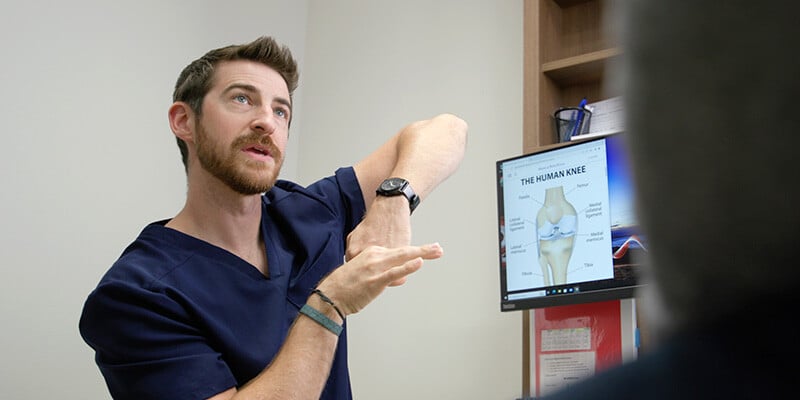Nutritional Nuance
One minute everyone is avoiding fat, the next they’re avoiding carbs. You’ve also probably heard breakfast is the most important meal of the day but now everyone seems to be skipping breakfast and doing intermittent fasting. The list of dos and don’ts is long, overwhelming and often contradictory. It seems easier to just stick with whatever it is you’re already doing. Learning these few basic concepts and terminology can help you feel more prepared to incorporate healthy eating into your life.
With nutrition comes nuance. There isn’t just one right way to eat. Need a few examples? Fasting for weight loss can be a choice for a 27-year-old male but can be harmful to a pregnant woman growing another human. For some, cottage cheese can be great for added protein, but if you are lactose intolerant—not so great. It’s always important to listen to and respect your body and your own internal cues and pay attention to those subtle food differences. The nuance.
Micro versus macro. Macronutrients, often known as “macros,” consist of protein, fat, and carbohydrates. Adding confusion, you've maybe heard why each one of these is good for you, or bad for you, or both. Macronutrients are nutrients you need in larger quantities, as opposed to micronutrients or “micros.” These are the vitamins and minerals that you need in smaller quantities.
Carbohydrates. It’s tough to say whether carbs or fat have gotten the worst rap in diet culture. Rest assured, you don’t need to go keto or carnivore. Carbohydrates are your body’s preferred source of quick burning energy. Basically, there are two categories of carbs, simple and complex. Simple carbs are known as sugar, and complex carbs are starches and fiber. Simple carbs get absorbed into your body quickly because they’re already broken down into a smaller form. Complex carbs need further breakdown which takes longer, giving you longer-lasting energy, more than those simple carbs.
Whole food sources of complex carbs provide a variety of vitamins, minerals, fiber, and other nutrients that support health in many ways. Yet, carbs still get shamed. It’s because many carbs consumed in the American diet are ultra-processed, like candy, white bread, pasta, soda, and more. These processed carbs lack vitamins and minerals that would otherwise be found in natural whole food carbs, like fruit, vegetables, grains, and legumes. Carbs broken down and processed to create a food product negatively affect your blood sugar. They are absorbed into your bloodstream too quickly, often causing dips and spikes in your blood sugar levels that can lead to poor health outcomes.
Fat. No, fat doesn’t make you fat. Fat is essential. It makes up about 60% of the human brain and is part of every cell in your body. Like carbs, not all fats are created equal. The nuance, like carbs, is also in the processing. Some fats are pressed at high temperatures from their natural source as oil, and then you cook with it at high temperatures. High temperatures cause sensitive and unstable oils to chemically change. When eaten, they cause you metabolic distress. Whole food sources of fat contain essential fatty acids. These fats are needed to absorb certain nutrients, keep you satisfied after a meal, and provide you with long lasting energy. And they taste good!
Protein. Protein has probably been the least vilified macronutrient and for good reason. It’s extremely important. You probably associate protein with muscle, and yes, protein is absolutely needed to build and maintain your muscles—but all tissues in your body rely on protein to support health. Protein plays a role in bone health. It is what enzymes, and some hormones are made of. It is necessary for a healthy immune system. It helps control fluid balance—and more. And last but not least, protein is also very satiating, meaning you’ll be satisfied from a meal that’s high in protein.
The nuance of protein is the type. Protein is made of 20 amino acids, nine of which must come from what you eat. A food that has all nine essential amino acids (EAA) is considered a complete protein. Sources of complete protein are mostly from animal sources, but there are plant-based sources in soy and pea protein. If you only eat a plant-based diet, it might be worth working with a certified nutritionist to ensure you’re consuming all the necessary EAA.
FUN FACT: Viaro has a certified nutritionist, and a certified health education specialist!
How much of each should I eat? There is no one-size-fits-all answer to this question. Some people who have labor-intensive jobs or athletes may need more carbs than those who sit at a desk. Are you trying to build muscle? You may need more protein. A general recommendation is to start building each meal around getting 25 grams of protein. Your activity level, goals, daily tasks, and more will affect your needs. Understand the nuance, listen to your body, and adjust as needed.
Whole foods are a great starting point. Not the Whole Foods grocery store, but the actual whole foods that are grown and minimally processed. Remember that there are processed foods that are good for you, like yogurt and chicken thighs. The growing concern is the ultra-processed foods, made from minimal food ingredients and packed with chemicals that provide little in the way of nutrition. These “foods” may actually cause harm to your body. Whole foods like fruits, vegetables, legumes, grains, certain dairy products, fish, eggs, and meats have nothing added or taken away from them.
Take heart, you may never be able to eat the perfect diet. There is not one right answer when it comes to nutrition. Start with eating whole, nutrient dense foods that you enjoy, those that provide you with the energy you need, and those that make you feel good. Would you like more information? Contact Viaro’s certified nutritionist at ashley@viarohealth.com or Viaro health educators at wellness@viarohealth.com!
Lila Tully, CHES
Health Education Specialist, ViaroThrive
For questions or comments, contact wellness@viarohealth.com



